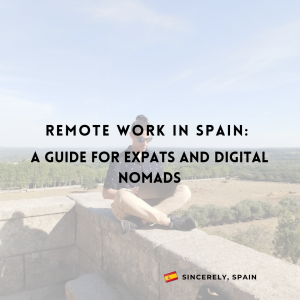
Remote Work In Spain: A Guide For Expats And Digital Nomads
Dear Rafa,

Recently we saw that you were looking for a job on LinkedIn for a job in Spain—or the possibility to work remotely in Spain. This lined up perfectly with a guest post article we have been working on together with Ilona from Jooble, a global job search platform. Today she is going to share with us some insights about remote work trends in Spain, the state of the Spanish labor market, the areas where remote workers and digital nomads are in demand, and the advantages of choosing Spain as your next destination for living abroad.
Without further ado, we bring you Ilona, an integral part of the Jooble team.
Remote Work In Spain: A Guide For Expats And Digital Nomads
Spain is a lovely and colourful country that covers the majority of the Iberian Peninsula, as well as the Canary and Balearic Islands. The azure waters of the Mediterranean Sea and the Atlantic Ocean wash this country.

A Few Words About The Labour Market In Spain
Since the start of the pandemic, the labour market in Spain has experienced fluctuations. The COVID-19 outbreak has had an extremely negative impact on employment and the country’s economy as a whole. During the quarantine period, people worked 3 hours less per week. Moreover, labour force participation fell by 2.3% due to the pandemic.

The quarantine stage stimulated the remote work format, which continues to this day in many professions and industries. This allows people to become digital nomads and work remotely from anywhere in the world.
Spain’s unemployment rate was 11.60% in the middle of the year. It became slightly higher now and reached 11.84%. The number of unemployed people is almost three million, as it increased by 92.7 thousand. This situation can be explained due to the end of the peak tourist season. On the other hand, the number of employed people climbed by 209.1 thousand. In addition, the labour force participation rate increased to 59.41% in the third quarter, up from 58.97% the previous quarter.
Some Industries Which Require Remote Workers
Spain is known as a country rich in beautiful nature, attractions and delicious food. For this reason tourism is highly developed there. So, the tourism industry is an excellent opportunity for work, including remote work. Some examples of such remote jobs are remote travel advisor, sales travel agent, travel consultant.
Technology and innovation are other developing fields for expats. Some cities like Barcelona and Valencia have an increasing number of tech startups and incubators. That is why there is a high demand for talented workers in the technological sector. If you are a software developer, data analytic or digital marketing specialist, you will easily find a job with an ability or working remotely.
Furthermore, multinational corporations with branches in Spain frequently employ expats in a wide range of jobs, particularly in management and international business. These businesses are looking for professionals with unique expertise in the sector to assist them improve cross-border operations and create a strong worldwide presence. It is possible to move to Spain with a remote job or find it there using the site https://jooble.org/jobs-spanish/Remote, where you will find a suitable job for every profession.
Why To Choose Remote Work In Spain
Remote work in Spain has many advantages:
- Weather. The famous Mediterranean has given the country hundreds of kilometres of beaches and an amazing climate, with a predominance of sunny days throughout the year. Its central part has a dry climate. The easterly the coast, the easier it is to endure the summer. The further west you go, the milder the winter. The continental climate of the centre of the country is more extreme in terms of temperature changes in winter and summer, but it does not prevent one from choosing it as a place of residence. The Atlantic North and the mountains can offer their future residents all four seasons of the year;
 Food and cuisine. Spanish cuisine is not known throughout the world like French or Italian, but the level of products is so good, and the dishes in each region are so different, that gastro tourism makes sense. And living in a country of high-quality products is a pure pleasure;
Food and cuisine. Spanish cuisine is not known throughout the world like French or Italian, but the level of products is so good, and the dishes in each region are so different, that gastro tourism makes sense. And living in a country of high-quality products is a pure pleasure;
The cost of living is relatively low. Living in Europe is an expensive pleasure. In the case of remote work, this is felt even more strongly. When choosing a country, you should calculate housing prices, tariffs for vital resources, food, and clothing. Spain is a relatively affordable country to live in. Spain is good in almost all areas: the leading country in the mass market is also the largest importer of fruit throughout the European Union.
How To Legally Work Remotely In Spain?
The first situation is when you have a remote job and just come to Spain for a short period of time to enjoy delicious food and great weather while working. A short period in this case is less than 90 days of stay in the country. For such a scenario, you only need a tourist visa (and if you are an EU citizen, then you don’t need a visa at all).
The second situation is if you come to Spain with remote work for a long period (that is, more than 90 days). Then you will need a Digital Nomad Visa or other visa that allows you to stay and work in Spain for longer periods of time. The mentioned remote worker visa for digital nomads has many advantages. First of all, this is an opportunity to live for a long time in Spain.
Who can get a Spain visa for remote work:
- The applicant may be a citizen of any country outside the European Union;
- Have no convictions for offences;
- Be a qualified specialist or have proven work experience;
- Work for yourself or a company located outside of Spain.
 Finding Accommodation In Spain
Finding Accommodation In Spain
This is the first step that expats and digital nomads have to take. After all, no matter what your occupation is, you need to live somewhere. Depending on your family composition and budget, different housing options are available. These can be apartments, houses and villas.
A variety of living spaces allows you to choose the ideal option that suits your lifestyle and preferences. Apart from apartments, houses and villas, hotel and hostel options are also available. This is a good budget option if you are moving with a remote job without a family. It is also suitable for the period while you are looking for permanent apartments.
One of the common destinations where relocants settle is Madrid. An apartment there can be rented for about 1000 euros per month. Another popular destination for remote workers is Alicante, because it is close to the sea and has gorgeous beaches. In addition, housing there can be found starting from 600 euros per month.
 Conclusion
Conclusion
For digital nomads, the world is wide open. In the era of digital mobility and remote work, boundaries are blurring, revealing endless possibilities for unforgettable adventures. Everyone can find their ideal refuge in Spain. True freedom knows no restrictions or passports, and only you decide where to go next.




